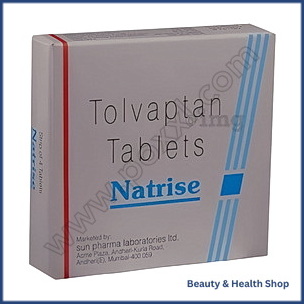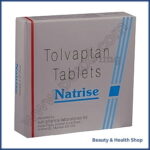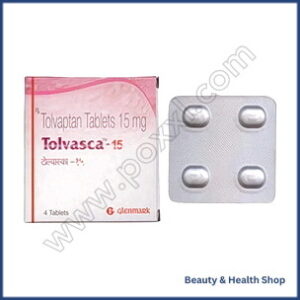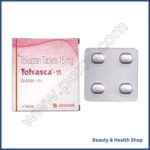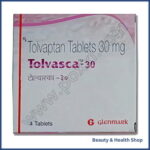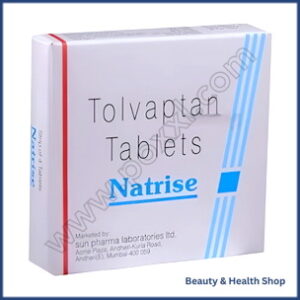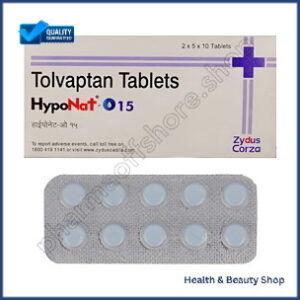ADDICTION
ALCOHOL DEPENDENCE
QUIT SMOKING
ALLERGY
ANTI FUNGAL
FUNGAL INFECTION
FUNGAL NAIL INFECTIONS
ANTI-REJECTION DRUGS
ANTI WORM
ANTIBIOTIC
BACTERIAL INFECTIONS
ARTHRITIS
GOUT
OSTEOARTHRITIS
RHEUMATOID ARTHRITIS
BLOOD
LOW PLATELET COUNT
THROMBOPHLEBITIS
VARICOSE VEINS
COLON
ANAL FISSURE
PILES
ULCERATIVE COLITIS
DIABETES CARE
DIABETES INSIPIDUS
DIABETES TYPE
DIABETIC FOOT ULCERS
GLUCOSE MONITOR
EYES/EAR CARE
DRY EYES
EYE CARE
EYE EXAMINATION
EYE INFECTION
EYE LASHES
EYE PAIN
GLAUCOMA
OCULAR HYPERTENSION
UVEITIS
FEVER CARE
MALARIA
RHEUMATIC FEVER
TYPHOID FEVER
GASTROINTESTINAL
ACIDITY
CONSTIPATION
CROHN'S DISEASE
DIARRHOEA
GALLBLADDER STONES
INTESTINAL ULCERS
IRRITABLE BOWEL SYNDROME
MOTION SICKNESS
NAUSEA
Natrise (Tolvaptan)
Natrise 15 mg (Tolvaptan)
Natrise 30 mg (Tolvaptan)
| Amount | Price | Price / Unit |
Qty | ||
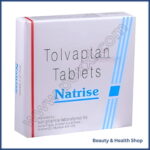
|
28 Pills | $375.00 | $13.39 |
||

|
56 Pills | $610.00 | $10.89 |
||

|
84 Pills | $875.00 | $10.42 |
| Active Ingredient (Generic Name): | Tolvaptan |
|---|---|
| Indication: | Syndrome of inappropriate antidiuretic hormone secretion (SIADH) |
| Manufacturer | Sun Pharmaceutical Industries Ltd |
| Packaging: | 4 tablets in one strip |
From: $375.00
Natrise, also known as Tolvaptan, is a medication that acts as a vasopressin receptor antagonist. It helps increase urine production, particularly beneficial for managing hyponatremia, fluid retention in heart failure, and liver disease. Primarily used to elevate sodium levels by blocking vasopressin effects on the kidneys, it is taken orally as directed by healthcare providers. Special precautions include evaluating kidney function before starting, adjusting dosages for liver issues, and monitoring fluid intake due to its impact on water balance. Be alert to side effects and consult healthcare professionals for interactions with other medications. Further details on various aspects can offer a deeper understanding.
Start here to understand the basics of Natrise (Tolvaptan) and its uses in medical treatment. Natrise, also known as Tolvaptan, is a medication that belongs to a class of drugs called vasopressin receptor antagonists. This medication works by increasing the amount of urine produced by your body, which helps to get rid of excess water. It is commonly prescribed to treat conditions such as hyponatremia, a condition where the body has low levels of sodium, and fluid retention in conditions like heart failure and liver disease.
Natrise is not a cure for these conditions but rather helps to manage symptoms and improve overall health. It is important to follow your healthcare provider’s instructions carefully when taking Natrise. Make sure to inform your doctor about any other medications you are taking to avoid potential interactions. Additionally, it is vital to stay adequately hydrated while on this medication to prevent dehydration. If you have any questions or concerns about Natrise, do not hesitate to consult your healthcare provider for further guidance.
Why is this medication prescribed?
To understand the necessity for prescribing Natrise (Tolvaptan), it is important to recognize its specific medical indications and benefits. Natrise is primarily prescribed for individuals with hyponatremia, a condition characterized by low levels of sodium in the blood. Hyponatremia can lead to symptoms such as nausea, headache, confusion, and in severe cases, seizures or coma. By blocking the action of vasopressin on the kidneys, Natrise helps the body to excrete excess water, which in turn helps to increase sodium levels in the blood, correcting the imbalance.
Additionally, Natrise is also used in the treatment of fluid retention (edema) in patients with conditions such as heart failure, liver cirrhosis, and certain kidney diseases. By reducing the amount of water reabsorbed by the kidneys, Natrise helps to decrease fluid buildup in the body, alleviating symptoms like swelling, shortness of breath, and fatigue. It is pivotal to follow your healthcare provider’s instructions carefully when taking Natrise to ensure excellent treatment outcomes.
How should this medicine be used?
For optimal results, follow your healthcare provider’s instructions on how to use Natrise (Tolvaptan) effectively. Typically, this medication is taken by mouth with or without food, as directed by your doctor. It is essential to take Natrise exactly as prescribed, at the same time each day, to maintain a consistent level of the drug in your body. Swallow the tablets whole with a glass of water; do not crush, chew, or break them.
Your healthcare provider will determine the appropriate dosage based on your medical condition and response to treatment. It is important not to increase or decrease your dose without consulting your doctor first. If you miss a dose, take it as soon as you remember, unless it is close to the time for your next dose. In that case, skip the missed dose and resume your regular dosing schedule.
Continue to take Natrise even if you feel well, as it is helping to control your condition. Do not stop taking this medication without consulting your healthcare provider, as sudden discontinuation may lead to worsening of your condition. If you have any questions or concerns about how to use Natrise, do not hesitate to reach out to your doctor for clarification.
Other uses for this medicine
When considering Natrise (Tolvaptan), it is important to note that this medication may also be used for other purposes as determined by your healthcare provider. Apart from treating hyponatremia (low sodium levels in the blood), Natrise can also be prescribed for conditions like heart failure, liver disease, and syndrome of inappropriate antidiuretic hormone secretion (SIADH). In heart failure, Tolvaptan helps by reducing fluid retention and easing the workload on the heart. For liver disease, it can assist in managing fluid buildup in the body. In cases of SIADH, where the body retains water excessively, Tolvaptan helps restore the balance of water and sodium levels. It is important to follow your healthcare provider’s instructions carefully when using Natrise for these alternative purposes to ensure safe and effective treatment. Always communicate any concerns or changes in your condition to your healthcare provider to receive the best possible care.
What special precautions should I follow?
Before beginning Natrise (Tolvaptan), it’s essential to thoroughly check your medical history. This step helps in identifying any potential risks or contraindications that may impact your treatment. By understanding your medical background, you and your healthcare provider can guarantee the safest and most effective use of this medication.
Check Medical History Thoroughly
Make sure to thoroughly review your medical history before starting Natrise (Tolvaptan) treatment. It is important to take into account any pre-existing conditions or medications that may interact with Natrise. Here are some special precautions to keep in mind:
- Kidney Function: Evaluate your kidney function as Natrise can affect it.
- Liver Health: Liver conditions may necessitate dosage adjustments.
- Fluid Intake: Monitor fluid intake carefully as Natrise impacts water balance.
- Pregnancy: Avoid Natrise if pregnant or planning pregnancy due to potential harm to the fetus.
- Allergies: Notify your healthcare provider of any allergies, especially to Tolvaptan or similar medications.
What special dietary instructions should I follow?
To maintain proper balance of electrolytes in your body, it is important to follow specific dietary instructions while taking Natrise (Tolvaptan). It is essential to monitor your intake of salt, as Natrise works by increasing the amount of water excreted through urine, which can lead to a loss of sodium. To counteract this effect, try to limit your salt intake by avoiding high-sodium foods like processed snacks, canned soups, and salty condiments. Opt for fresh fruits and vegetables, lean proteins, and whole grains to maintain a healthy balance.
Additionally, make sure to stay hydrated by drinking plenty of water throughout the day. This is important to prevent dehydration, especially with increased urination caused by Natrise. Be mindful of your fluid intake and aim to consume enough water to compensate for the extra loss due to the medication. Following these dietary recommendations can help support the effectiveness of Natrise while keeping your electrolyte levels in check.
What should I do if I forget a dose?
If you forget a dose of Natrise (Tolvaptan), take it as soon as you remember, unless it is close to the time for your next scheduled dose. In that case, skip the missed dose and continue with your regular dosing schedule. Do not take a double dose to make up for a missed one. It is important to maintain a consistent dosing schedule with Natrise to guarantee its effectiveness in managing your condition. If you are unsure about what to do if you miss a dose or if you have any concerns, consult your healthcare provider or pharmacist for guidance. Keeping a daily medication schedule or setting reminders can help you remember to take your doses on time. Remember that adherence to your prescribed dosing regimen is critical for Natrise to work at its best in helping you manage your condition effectively.
What side effects can this medication cause?
Natrise (Tolvaptan) may cause side effects that require close monitoring. Some of these side effects can be significant, so it’s important to be vigilant. If you notice any persistent unusual symptoms, contact your doctor promptly.
Monitor Persistent Unusual Symptoms Closely
Persistent unusual symptoms should be closely monitored when taking Natrise (Tolvaptan) due to potential side effects of the medication. Some common side effects may include:
- Dry mouth
- Frequent urination
- Weakness
- Dizziness
- Thirst
These symptoms are generally mild and may improve as your body adjusts to the medication. However, it is essential to keep track of any unusual or persistent symptoms and report them to your healthcare provider. Monitoring these side effects closely can help in managing your treatment effectively and ensuring your well-being while using Natrise (Tolvaptan).
Some side effects can be serious. If you experience any of the following symptoms, call your doctor immediately:
Serious side effects of Natrise (Tolvaptan) may include:
- Severe allergic reactions such as rash, itching, swelling of the face, tongue, or throat
- Liver problems indicated by yellowing of the skin or eyes, dark urine, or persistent nausea
- Dehydration symptoms like extreme thirst, very dry mouth, severe weakness, dizziness, or confusion
- Rapid weight loss due to excessive urination
- Unusual tiredness or weakness that persists
If you encounter any of these symptoms while taking Natrise (Tolvaptan), it is important to contact your healthcare provider promptly. These side effects require immediate medical attention to address any potential complications and safeguard your well-being.
What should I know about the storage and disposal of this medication?
When storing Natrise (Tolvaptan), make sure to keep it in a cool, dry place away from direct sunlight and moisture. It is important to store this medication at room temperature between 68-77 degrees Fahrenheit (20-25 degrees Celsius). Avoid storing it in the bathroom or kitchen where there may be excess moisture. Keep Natrise in its original packaging to protect it from light. Make sure to keep it out of reach of children and pets.
When it comes to disposing of Natrise, do not flush it down the toilet or pour it into a drain unless instructed to do so. Properly discard this medication when it is no longer needed or has expired. You can consult your pharmacist or local waste disposal company on how to safely dispose of Natrise. It is essential to follow the recommended disposal guidelines to prevent any harm to the environment and others. If you have any questions regarding the storage or disposal of Natrise, do not hesitate to contact your healthcare provider for further guidance.
In case of an emergency/overdose
In the event of an emergency or overdose involving Natrise (Tolvaptan), promptly seek medical assistance by contacting your local poison control center or emergency services. If you suspect an overdose or experience severe symptoms such as extreme thirst, confusion, weakness, dizziness, or fainting, do not hesitate to call for help immediately. It is vital to provide healthcare providers with detailed information about the medication taken, the dosage, and the time of ingestion to guarantee appropriate treatment.
While waiting for medical help to arrive, do not attempt to induce vomiting unless instructed by healthcare professionals. Stay calm and try to keep the affected individual comfortable and hydrated if possible. Avoid giving any other medications unless advised by a healthcare provider.
Remember that timely intervention in cases of overdose or emergencies involving Natrise (Tolvaptan) can have a significant impact on the outcome. Prompt medical attention is essential for the well-being and safety of the individual affected.
What other information should I know?
For additional important details, consult your healthcare provider or pharmacist regarding Natrise (Tolvaptan) and its potential interactions with other medications or conditions. It is essential to inform your healthcare provider about all the medications, supplements, and herbal products you are currently taking before starting Natrise. This includes prescription and over-the-counter medicines, vitamins, and any other substances you use regularly. Your healthcare provider will be able to assess the potential interactions and adjust your treatment plan accordingly.
Additionally, it is important to monitor your fluid intake while taking Natrise. Your healthcare provider may recommend specific guidelines to help you maintain a proper fluid balance. It is vital to follow these recommendations closely to make sure the medication works effectively and to prevent any complications.
If you experience any new or worsening symptoms while taking Natrise, such as dizziness, lightheadedness, or changes in urination patterns, contact your healthcare provider promptly. These symptoms could indicate a need for adjustment in your treatment plan.
Brand names
Consider asking your healthcare provider about the various brand names under which Natrise (Tolvaptan) may be available. Different brands of Tolvaptan may exist in the market, and your healthcare provider can provide you with specific information regarding these brand names. This knowledge can be crucial when obtaining your medication, as the brand names might vary based on the manufacturer or country of origin.
Here is a table listing some common brand names of Tolvaptan:
| Brand Name | Active Ingredient |
|---|---|
| Natrise | Tolvaptan |
| Samsca | Tolvaptan |
| Jinarc | Tolvaptan |
| Tolvat | Tolvaptan |
It is important to be aware of these brand names to make sure you are getting the correct medication prescribed by your healthcare provider. If you have any questions about the brand names or need further clarification, do not hesitate to consult your healthcare provider for guidance.
Purchase Options Nearby
Explore nearby pharmacies for convenient purchase options of Natrise (Tolvaptan). When looking to buy Natrise, it is crucial to check with local pharmacies to find the closest location that stocks this medication. Start by searching online for pharmacies near you that carry Natrise. You can also call different pharmacies to inquire about availability and pricing. Some pharmacies may offer discounts or have special deals, so it is worth checking multiple locations to compare prices. Additionally, consider asking your healthcare provider or pharmacist for recommendations on where to purchase Natrise. They may have insights on which pharmacies are more likely to have this medication in stock. Remember to verify the pharmacy’s operating hours to make sure they will be open when you plan to make your purchase. By exploring nearby pharmacies, you can find the most convenient and accessible option for buying Natrise.
To summarise
In conclusion, when looking to purchase Natrise (Tolvaptan), it is vital to extensively research nearby pharmacies for availability and pricing. Different pharmacies may have varying stock levels and pricing structures, so comparing options can help you find the most cost-effective source for your medication. Additionally, inquire about any discounts, coupons, or insurance coverage that could lower your out-of-pocket expenses. It’s important to make sure that the pharmacy you choose is reputable, licensed, and able to provide genuine Natrise (Tolvaptan) to safeguard your health and well-being.
When researching pharmacies, consider factors such as location convenience, operating hours, and customer service quality. Some pharmacies may offer delivery services or online ordering options, which can be beneficial if you have mobility issues or prefer the convenience of home delivery. By taking the time to explore your purchasing options thoroughly, you can make an informed decision that meets your medication needs while also being mindful of your budget constraints.


